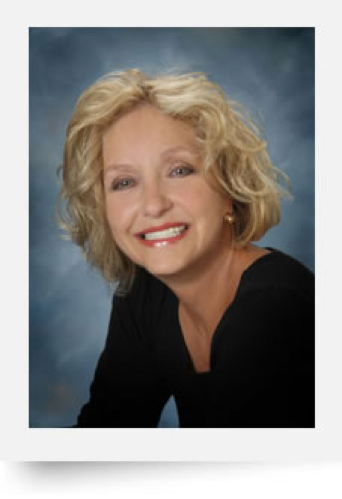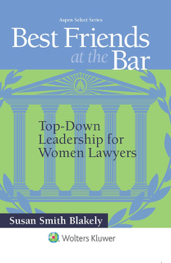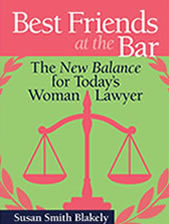Susan Smith Blakely is the award-winning author of the Best Friends at the Bar books for all young lawyers and those who mentor and lead them. As the recipient of the 2015 Ms. JD Sharing Her Passion Award and the Lawyers Monthly Women in Law Award 2016, the Best Friends at the Bar project has been recognized for making a positive difference for women in the law. Her most recent books, What Millennial Lawyers Want and New Lawyer Launch, are for ALL YOUNG LAWYERS and addresses the challenges to the profession presented by a generation of lawyers who think differently and work differently.
In Her Own Words
 When you tell people you are an author, they usually want to know what motivates you. When you’ve retired from a long and successful career, they are often curious about why you aren’t just relaxing on a beach somewhere. If you and I had a few minutes to talk, I might answer like this…
When you tell people you are an author, they usually want to know what motivates you. When you’ve retired from a long and successful career, they are often curious about why you aren’t just relaxing on a beach somewhere. If you and I had a few minutes to talk, I might answer like this…
Of course I am motivated by my own struggles practicing law at a time when there were not so many women in the profession. I am concerned watching so many talented young women lawyers leave the profession because of the unique challenges they face as practitioners. My concerns for their futures in the law resulted in the three-book Best Friends at the Bar series.
But it is more than that. I also am motivated by the struggles of ALL young lawyers — both male and female — in a profession that resists change. Watching young lawyers struggle within environments that do not meet their needs and working for senior lawyers, who do not recognize their value, really gets my attention.
In researching millennial lawyers, I discovered the values of the Millennial Generation. I liked what I read, and I saw a bridge back to a past generation of lawyers whose values I admire. My book, What Millennial Lawyers Want: A Bridge from the Past to the Future of Law Practice (Wolters Kluwer/Aspen Publishers, 2018), was the result.
So, let’s dig a little deeper into what motivates me to write about WOMEN LAWYERS and MILLENNIAL LAWYERS.
First, WOMEN LAWYERS because that is where the Best Friends at the Bar project started. I am devoted to the concept of women helping women. I have been involved in women’s issues for most of my life, and I am thrilled that my books for young women lawyers offer career advice that has the potential to make a difference in women’s lives. I could not have written these books while I was busy practicing law, but now I am fortunate to be in a position to bring together the collective wisdom of more than 60 women who struggled and triumphed during their legal careers—many of whom I count as my best friends at the bar.
However, it is not all up to young women to improve their career expectations. The solutions also will depend on the participation of law firm leaders and managers. That is why I wrote the third book, Best Friends at the Bar: Top-Down Leadership for Women Lawyers, which is directed to the mostly male leadership in law firms. It makes the case for why high attrition for women lawyers is not only squandering talent but also is not a good business decision for law firms.
Writing about what women need to know for successful and satisfying careers in the law is a natural extension of my passions for writing and mentoring. I have spent countless rewarding hours offering career advice and mentoring young women lawyers over the years, and I am still troubled by the high percentage of women who abandon legal careers out of frustration with the system, gender issues, and the challenges of work-life balance. Something must be done to change those dynamics—and it all starts with mentoring and passing along the knowledge that will enable these women to make better decisions and create the work-life balance they deserve.
Young women need to be aware of the great benefits and the significant challenges facing women in the law. By helping young women lawyers make informed choices as they plan their careers and making them understand the responsibility that they have to each other while striving to reach their goals, we empower them to take charge of their professional and personal lives.
In the long run, encouraging women lawyers to embrace cooperative approaches in their careers will improve practice conditions and retention rates and, in turn, will provide opportunities for more women to advance to the top levels of law firm management. Women at the top will bring different experience-based perspectives and will have the potential to positively influence workplace environments.
Second, MILLENNIAL LAWYERS. The subject of millennial lawyers fits nicely under the umbrella of lawyers helping lawyers and being “best friends” within the legal bar. Just as the needs of women lawyers have been misunderstood and marginalized, the needs of millennial lawyers also are misunderstood and marginalized by generations of more senior lawyers who simply do not understand this new generation.
It is very risky business for lawyers of the Baby Boomer Generation, who are retiring in large numbers, and the lawyers of the much smaller Generation X, who are becoming the law firm leaders, to ignore the needs of millennial lawyers. The Millennial Generation is huge. By 2030, millennials will be 75% of the workforce. And the clients of millennial lawyers will be 75% of the workforce — clients that want to work with millennial lawyers who understand them.
This means that millennial lawyers are poised to lead law firms sooner than anyone every imagined, and law firms need to embrace this new generation of lawyers early to retain their value and turn them into effective leaders.
Embracing millennial lawyers means learning about them and being willing to make changes in the workplace to respond to their values and their needs. Ignoring the existence of these young professionals and allowing them to suffer loneliness from lack of interest in them, both professionally and personally, will discourage them and drive them out of the profession. If that is the result, we can prepare to shut down law firms as we know them today.
My work on behalf of millennial lawyers is not only to validate what millennial lawyers represent but also to educate senior lawyers and law firm leadership about the values and perspectives that this huge generation of young lawyers bring to the workplace.
What Millennial Lawyers Want addresses all of those subjects and more. It also includes entertaining stories to illustrate the values that both a past generation of lawyers and millennial lawyers hold dear. And those stories are from my own experience watching my father and his colleagues, who practiced law post World War II. These are not ancient values. These are values that distinguished those lawyers as part of The Greatest Generation. These stories are as relevant today as they were sixty years ago.
Writing a book is always a huge undertaking, and my books are both a labor of love and a celebration of young lawyers — young women lawyers and ALL millennial lawyers. I grew up with the law and it always has been a part of my life. From those early experiences, I learned to admire the players who tried to bring about positive change and improve the human condition. They still have my greatest respect and admiration, and, in my own small way, I hope to carry on their legacy by reaching out to the young lawyers — both men and women alike — who are the future of the profession.
Susan Smith Blakely Bio
Ms. Blakely graduated from the University of Wisconsin with distinction and from Georgetown Law where she was a teaching fellow. Her diverse background includes private practice with law firms, specializing in litigation and land use law, experience in both state and federal courts and before administrative commissions and boards, and service in the public sector as Chief of Staff for an elected official. During her practice years, Ms. Blakely published the following comprehensive articles in academic law journals:
Credit Opportunities for Women: The ECOA and Its Effects, Wisconsin Law Review, Fall 1981.
Judicial and Legislative Attitudes Toward the Right to an Equal Education for the Handicapped, Ohio State Law Journal, Fall 1979.
After 25 years of practice and public service, Ms. Blakely retired as a law firm partner in 2006 to devote herself to issues challenging young lawyers. When she is not writing, Ms. Blakely enjoys reading, playing the piano, gardening, summers at the shore, traveling, being with family and friends, and serving on not-for-profit boards of directors.
Ms. Blakely is the author of the following books:
Best Friends at the Bar: The New Balance for Today’s Woman Lawyer (Wolters Kluwer Law & Business, 2012);
Best Friends at the Bar: Top-Down Leadership for Women Lawyers (Wolters Kluwer Law & Business, n2015);
What Millennial Lawyers Want: A Bridge from the Past to the Future of Law Practice (Wolters Kluwer/Aspen Publishers, 2018); and
New Lawyer Launch: The Handbook for Young Lawyers (Full Court
Press, 2022)














